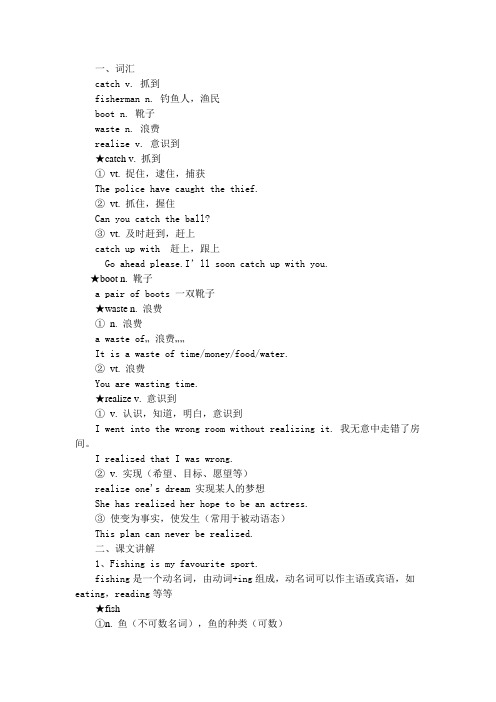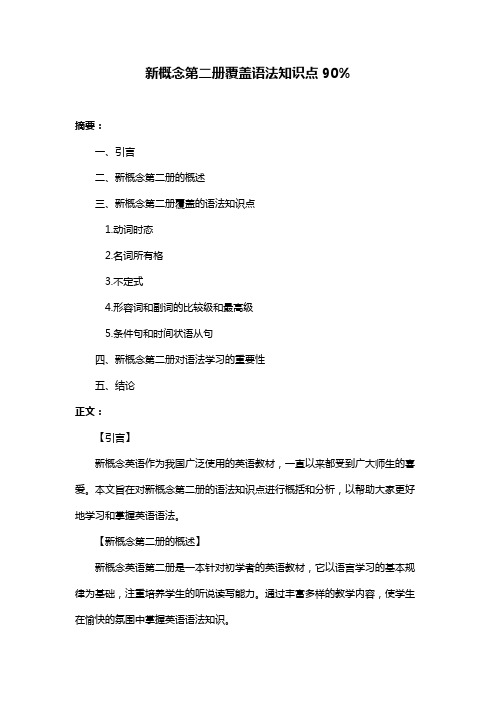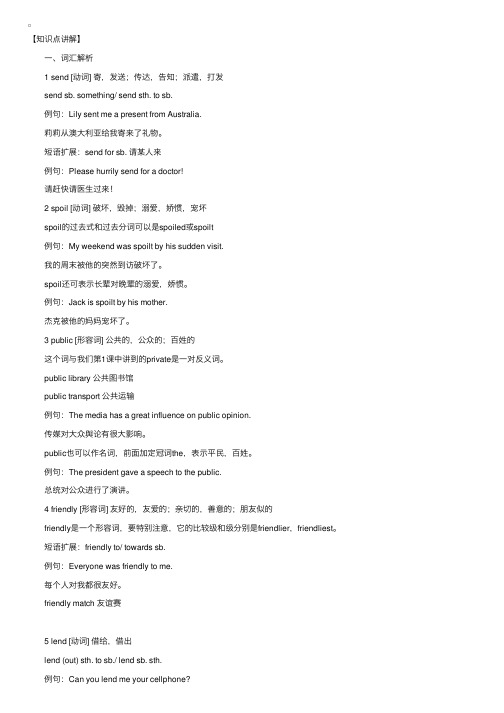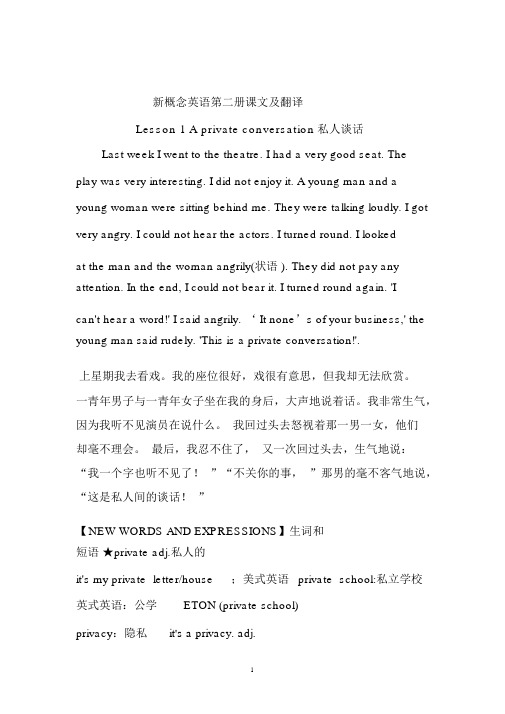新概念第二册讲解
新概念英语第二册Lesson+86+Out+of+control+课文讲解讲义

新概念英语第二册第86课Lesson 86 Out of control 失控As the man tried to swing the speedboat round, the steering wheel came away in his hands. He waved desperately to his companion, who had been water skiing for the last fifteen minutes. Both men had hardly had time to realize what was happening when they were thrown violently into the sea. The speedboat had struck a buoy, but it continued to move very quickly across the water. Both men had just begun to swim towards the shore, when they noticed with dismay that the speedboat was moving in a circle. It now came straight towards them at tremendous speed. In less than a minute, it roared past them only a few feet away. After it had passed, they swam on as quickly as they could because they knew that the boat would soon return. They had just had enough time to swim out of danger when the boat again completed a circle. On this occasion, however, it had slowed down considerably. The petrol had nearly all been used up. Before long, the noise dropped completely and the boat began to drift gently across the water.New words and expressions 生词和短语swing v. 转向speedboat n.快艇desperately adv. 绝望地companion n. 同伙,伙伴water ski (快艇牵引水橇)滑水buoy n.浮标dismay n. 沮丧tremendous adj. 巨大的petrol n.汽油drift v.漂动,漂流gently adv.缓慢地,轻轻地参考译文当那人试图让快艇转弯时,方向盘脱手了。
(完整版)新概念英语第二册第20课课文讲解

一、词汇catch v. 抓到fisherman n. 钓鱼人,渔民boot n. 靴子waste n. 浪费realize v. 意识到★catch v. 抓到①vt. 捉住,逮住,捕获The police have caught the thief.②vt. 抓住,握住Can you catch the ball?③vt. 及时赶到,赶上catch up with 赶上,跟上Go ahead please.I’ll soon catch up with you.★boot n. 靴子a pair of boots 一双靴子★waste n. 浪费①n. 浪费a waste of… 浪费……It is a waste of time/money/food/water.②vt. 浪费You are wasting time.★realize v. 意识到①v. 认识,知道,明白,意识到I went into the wrong room without realizing it. 我无意中走错了房间。
I realized that I was wrong.②v. 实现(希望、目标、愿望等)realize one's dream 实现某人的梦想She has realized her hope to be an actress.③使变为事实,使发生(常用于被动语态)This plan can never be realized.二、课文讲解1、Fishing is my favourite sport.fishing是一个动名词,由动词+ing组成,动名词可以作主语或宾语,如eating,reading等等★fish①n. 鱼(不可数名词),鱼的种类(可数)There are a lot of fishes(表示种类)in the sea.②v. 钓鱼, 捕鱼2、I often fish for hours without catching anything.for+时间表示一段时间for hours=for some hours 数小时without catching anything作为状语而出现, 表示结果状语。
新概念英语第二册+Lesson+4+An+exciting+trip+讲义

新概念英语第二册Lesson 4 An exciting tripI have just received a letter from my brother, Tim. He is in Australia. He has been there for six months. Tim is an engineer. He is working for a big firm and he has already visited a great number of different places in Australia. He has just bought an Australian car and has gone to Alice Springs, a small town in the centre of Australia. He will soon visit Darwin From there, he will fly to Perth. My brother has never been abroad before, so he is finding2 this trip very exciting.参考译文我刚刚收到弟弟蒂姆的来信,他正在澳大利亚。
他在那儿已经住了6个月了。
蒂姆是个工程师,正在为一家大公司工作,并且已经去过澳大利亚的不少地方了。
他刚买了一辆澳大利亚小汽车,现在去了澳大利亚中部的小镇艾利斯斯普林斯。
他不久还将到达尔文去,从那里,他再飞往珀斯。
我弟弟以前从未出过国,因此,他觉得这次旅行非常激动人心。
单词1.exciting adj. 令人兴奋的excited adj. (感到)兴奋的excite v. 令……兴奋(人作主语)It must be an exciting trip. 那一定是一次令人兴奋的旅行。
类似的词:surprising 令人惊奇的surprised 感到惊奇的interesting 令人感兴趣的interested 感到感兴趣的shocking 令人震惊的shocked 感到震惊的statisfying 令人满意的statisfied 感到满意的disappointing 令人失望的disappointed 感到失望的moving 令人感动的moved 感到感动的touching 令人感动的touched 感到感动的embarrassing 令人尴尬的embarrassed 感到尴尬的2.receive vt.(1)接到,收到,得到:When did you receive that letter?你什么时候收到那封信的?Susan received a gift/card this morning.今天上午苏珊收到了一份礼物/一张卡。
新概念英语第二册课文详解

新概念英语第二册课文详解新概念英语第二册课文详解课文详注一FurthernotesonthetextstweekIwenttothetheatre.上星期我去看戏。
(1)句首的“Lastweek”点明叙述的事情发生的时间是上星期。
因此整篇课文的时态基本上应是过去时(包括过去进行时),直接引语部分的时态除外。
(2)动词go的原义是离开一个地方去另一个地方,与介词to连用后,常加上主语所要去的目的地来代表主语的动作目的。
课文中gotothetheatre=gotothetheatretoseeaplay,即去剧场看戏。
类似的还有gotothecinema=gotothecinematoseeafilm(去电影院看电影)。
这种表达方式简明扼要。
请注意在以下的短语中名词前通常不加冠词:gotoschool上学gotobed上床睡觉gotochurch上教堂,去做礼拜(cf.第1册第68课atschool,atchurch;第1册第85课havebeentoschool/church)2.hadaverygoodseat座位很好seat一般指戏院、汽车等配置的固定座位,也可以抽象地表示“座位”或“位子”的概念:thefrontseatofacar汽车的前座Takeaseat,please.请坐。
3.Theplaywasveryinteresting.戏很有意思。
interesting属于现在分词形式的形容词,意思是“使人感兴趣”。
它通常与非人称主语连用或修饰某个事物:Thisisaninterestingbook/idea.这是一本有趣的书/一个令人感兴趣的主意。
4.…weresittingbehindme.Theyweretalkingloudly.……坐在我的身后,大声地说着话。
这两句的时态为过去进行时。
(cf.第7课语法)5.Igotveryangry.我变得非常生气。
get在这里有“逐渐变得”的含义,接近become,是个表示过程的动词,表示状态的变化。
新概念英语第二册23课讲解

新概念英语第二册23课讲解
《新概念英语》第二册的第23课是关于"Time off"(休假)的讲解。
这一课主要介绍了人们在工作中享受休假的重要性以及如何合理利用休假时间。
首先,休假对于工作人员来说非常重要。
它不仅可以帮助他们恢复体力和精神状态,还可以提高工作效率和生产力。
休假可以帮助人们摆脱工作的压力和疲劳,使他们更加积极主动地投入到工作中。
在课文中,作者提到了一位名叫约翰的人,他在工作中非常努力,但是从未休过假。
这导致他的健康状况恶化,最终不得不辞去工作。
这个例子告诉我们,合理利用休假时间对于个人的身心健康至关重要。
此外,课文还介绍了一些人们在休假期间可以做的活动,例如旅行、参加体育活动、与家人朋友相聚等。
这些活动可以帮助人们放松身心,增加生活乐趣,丰富个人经验。
除了个人的休假需求,企业也应该重视员工的休假。
给予员工
适当的休假时间可以提高员工的满意度和忠诚度,有助于保持员工
的工作动力和积极性。
此外,休假还可以促进员工之间的合作和团
队精神,提高整体工作效率。
然而,合理利用休假时间也需要注意一些问题。
首先,要根据
个人的实际情况和需要安排休假时间。
其次,要提前与上级或团队
沟通,确保休假期间工作的顺利进行。
最后,要合理安排休假计划,避免过度放松或过度劳累。
总之,休假对于个人和企业来说都是非常重要的。
它可以帮助
人们恢复体力和精神状态,增加生活乐趣,提高工作效率和生产力。
因此,我们应该合理利用休假时间,注重身心健康,并与工作和生
活取得良好的平衡。
新概念英语第二册课文知识点详解

NEW CONCEPT ENGLISH BOOK 2practice : 训练, progress : 进步If you practice more, then you can make great progress.五项综合训练技能listening : 听力speaking : 说话grammar : 语法writing : 写作reading : 阅读translation : 译knowledge +skillsLesson 1 A private conversation【New words and expressions】(12)private adj. 私人的conversation n. 谈话theatre n. 剧场,戏院seat n. 座位play n. 戏loudly adv. 大声地angry adj. 生气的angrily adv. 生气地attention n. 注意bear v. 容忍business n. 事rudely adv. 无礼地,粗鲁地★private adj.私人的★ adj. 私人的private life 私生活private school 私立学校It's my private letter. (如果妈妈想看你的信)It's my private house. (如果陌生人想进你的房子)★ adj. 普通的private citizen 普通公民I’m a private citizen. (citizen n. 公民)private soldier 大兵《Private Ryan》(《拯救大兵瑞恩》)public adj. 公众的,公开的(private的反义词)public school 公立学校public letter 公开信public place 公共场所privacy n.隐私It’s privacy. 这是我的隐私!(不愿让别人知道的)★conversation n.谈话have a + talk/chat/dialogue/conversation/gossip 名词变动词conversation 一般用于正式文体中, 内容上往往不正式subject of conversation 话题They are having a conversation.talk 内容可正式可不正式, 也可以私人Let’s have a talk.dialogue 对话, 可以指正式国家与国家会谈China and Korea are having a dialogue.chat 闲聊,就是北京人说的“侃”,说的是无关紧要的事。
新概念第二册ppt课件

• 以下短语中名词前不加冠词与加冠词意思有区别 • go to school 去上学; go to the school 去学校; • go to hospital去看病; go to the hospital去医院
3、I did not enjoy it. enjoy vt. 欣赏,享受,喜爱 ① enjoy +n. 喜欢,从当中得到一种享受(后面不能跟人) eg. I enjoy the music. enjoy the dinner\film\game ② enjoy oneself/代词 玩的开心 eg. We always enjoy ourselves. ③ enjoy +动名词 eg. Jane doesn’t enjoy swimming.
【课文讲解】
1、Last week I went to the theatre. • go to the +地点 表示去某地干什么事 • go to the theatre = go to the theatre to see a play去剧 场看戏 • go to the cinema =see a film 去电影院看电影
+ to sb. \ sth.
★business n. 事, 生意 • ① n. 生意 • businessman 生意人 • businesswoman • do business: 做生意 • go to some place on business:因公出差 eg. I went to Tianjin on business.
新概念第二册覆盖语法知识点90%

新概念第二册覆盖语法知识点90%摘要:一、引言二、新概念第二册的概述三、新概念第二册覆盖的语法知识点1.动词时态2.名词所有格3.不定式4.形容词和副词的比较级和最高级5.条件句和时间状语从句四、新概念第二册对语法学习的重要性五、结论正文:【引言】新概念英语作为我国广泛使用的英语教材,一直以来都受到广大师生的喜爱。
本文旨在对新概念第二册的语法知识点进行概括和分析,以帮助大家更好地学习和掌握英语语法。
【新概念第二册的概述】新概念英语第二册是一本针对初学者的英语教材,它以语言学习的基本规律为基础,注重培养学生的听说读写能力。
通过丰富多样的教学内容,使学生在愉快的氛围中掌握英语语法知识。
【新概念第二册覆盖的语法知识点】1.动词时态新概念第二册详细讲解了英语中的各种时态,如一般现在时、一般过去时、一般将来时等,使学生能够正确地运用时态来描述动作的发生和时间。
2.名词所有格本册教材介绍了名词所有格的用法,如"s表示名词所有格,使学生能够准确地表示名词的归属关系。
3.不定式新概念第二册讲解了不定式的概念和用法,如作主语、宾语、表语等,使学生能够理解并运用不定式来表示目的、原因等。
4.形容词和副词的比较级和最高级本册教材详细介绍了形容词和副词的比较级和最高级的构成及其用法,使学生能够正确地表示事物之间的比较关系。
5.条件句和时间状语从句新概念第二册对条件句和时间状语从句进行了系统的讲解,使学生能够理解并运用这两种从句来表示条件、时间等关系。
【新概念第二册对语法学习的重要性】新概念第二册覆盖了英语语法知识点的90%,为学生打下了扎实的语法基础。
通过本册教材的学习,学生能够掌握英语的基本语法规则,为进一步学习英语提供良好的基础。
【结论】综上所述,新概念第二册作为一本针对初学者的英语教材,对语法知识的覆盖面广泛,对学生的英语学习具有重要的指导意义。
新概念英语第二册第三课课文详解

【知识点讲解】 ⼀、词汇解析 1 send [动词] 寄,发送;传达,告知;派遣,打发 send sb. something/ send sth. to sb. 例句:Lily sent me a present from Australia. 莉莉从澳⼤利亚给我寄来了礼物。
短语扩展:send for sb. 请某⼈来 例句:Please hurrily send for a doctor! 请赶快请医⽣过来! 2 spoil [动词] 破坏,毁掉;溺爱,娇惯,宠坏 spoil的过去式和过去分词可以是spoiled或spoilt 例句:My weekend was spoilt by his sudden visit. 我的周末被他的突然到访破坏了。
spoil还可表⽰长辈对晚辈的溺爱,娇惯。
例句:Jack is spoilt by his mother. 杰克被他的妈妈宠坏了。
3 public [形容词] 公共的,公众的;百姓的 这个词与我们第1课中讲到的private是⼀对反义词。
public library 公共图书馆 public transport 公共运输 例句:The media has a great influence on public opinion. 传媒对⼤众舆论有很⼤影响。
public也可以作名词,前⾯加定冠词the,表⽰平民,百姓。
例句:The president gave a speech to the public. 总统对公众进⾏了演讲。
4 friendly [形容词] 友好的,友爱的;亲切的,善意的;朋友似的 friendly是⼀个形容词,要特别注意,它的⽐较级和级分别是friendlier,friendliest。
短语扩展:friendly to/ towards sb. 例句:Everyone was friendly to me. 每个⼈对我都很友好。
新概念第二册 PPT 课件

旅游英语
将课程内容与旅游场景相 结合,教授学生在旅游过 程中如何运用英语进行沟 通和表达。
课程实践活动的组织与实施
小组讨论
组织学生进行小组讨论,培养学 生的团队协作和沟通能力,提高 学生的口语表达和听力理解能力
。
角色扮演
组织学生进行角色扮演活动,模拟 真实场景中的对话和交流,培养学 生的口语表达和听力理解能力。
倒装句。
03
课程实践与应用
听说读写各项技能训练
听力训练
通过播放英语音频材料,训练 学生的英语听力理解能力,提 高语音识别和信息捕捉能力。
口语训练
通过模拟真实场景的对话练习 ,培养学生的英语口语表达能 力,增强自信心和沟通技巧。
阅读训练
通过阅读英文文章和短篇小说 ,提高学生的阅读理解能力和 词汇量,培养阅读兴趣和习惯 。
03
和英语能力,以便更好地引导学生学习。
如何根据学生需求选择合适的教材
了解学生需求
在选择教材之前,教师应了解学生的 学习目标、英语水平、兴趣爱好等,
以便选择最适合学生的教材。
考虑学生的实际生活经验和背景,选 择更贴近学生需求的教材。
比较不同教材的特点
教师应对各种教材进行比较,了解其 特点、难度、教学方法等,以便为学 生选择最适合的教材。
教学内容:都涵盖了语法、词汇、阅读、听力等语言学习的各个方面。
与其他教材的异同点分析
• 教学方法:都采用了多种教学方法,如任务型教学、情景 教学等。
与其他教材的异同点分析
01
不同点
02
教材内容:新概念第二册与其他教材在内容上有所不同,新概念第二 册更注重实际应用,话题更贴近生活。
03
难度:新概念第二册的难度相对于其他教材略高,语法点和词汇量更 大。
新概念第二册课文精讲(含词汇讲解翻译)

新概念英语第二册课文及翻译Lesson 1 A private conversation私人谈话Last week I went to the theatre. I had a very good seat. The play was very interesting. I did not enjoy it. A young man and a young woman were sitting behind me. They were talking loudly. I got very angry. I could not hear the actors. I turned round. I lookedat the man and the woman angrily(状语 ). They did not pay any attention. In the end, I could not bear it. I turned round again. 'Ican't hear a word!' I said angrily. ‘ It none’s of your business,' the young man said rudely. 'This is a private conversation!'.上星期我去看戏。
我的座位很好,戏很有意思,但我却无法欣赏。
一青年男子与一青年女子坐在我的身后,大声地说着话。
我非常生气,因为我听不见演员在说什么。
我回过头去怒视着那一男一女,他们却毫不理会。
最后,我忍不住了,又一次回过头去,生气地说:“我一个字也听不见了!”“不关你的事,”那男的毫不客气地说,“这是私人间的谈话!”【N EW WORDS AND EXPRESSIONS】生词和短语★private adj.私人的it's my private letter/house;美式英语private school:私立学校英式英语:公学ETON (private school)privacy:隐私it's a privacy. adj.《P rivate Ryan》 private soldier :大兵private life :私生Letter n. 首字母public:公众的,公开的public school ; public letter公开信;public place :公共场所★c onversation n.谈话 uni verse 转动 uniformUni--bi--tri--quar-pent-sex/hex-sept-oct-nov---decBilateral trade 双边贸易triangle quarter pentagon sex古罗马历法10 个月 ---12凯撒大帝julis---July七月屋大维augusto--August 八月September 九月 (原七月) ---septwolvesOctober 十月(原八月) ---octopusNovemberDecember----decadesubject of conversation :话题辨析: conversation, dialogue, talk, chat这些名词均含“交谈”之意。
新概念英语第二册第九课课文详解

Lesson 9 A cold welcome 冷遇 ⼀、⽣词讲解 1、welcome n. 欢迎;v. 欢迎 a cold welcome 冷遇 welcome to+地点 例如:welcome to China You are welcome./welcome adj.或You are welcome to+地点 例如:welcome to my home/welcome home/ welcome back 2、crowd n. ⼈群 crowd :in the crowd I spotted him in the crowd ⼀眼看见 a crowd of people 没有次序的⼈群,拥挤的⼈群 a group of people 有次序的⼈群 crowd v.拥挤,挤满 a large crowd of people ⼀⼤群⼈/crowds of people 许多⼈,⼈⼭⼈海 3、gather v. 聚集 people gathered ⼈们聚集在⼀起,尤指⾃发性的聚集 4、hand n. (表或机器的)指针 hand n.⼿ minute hand/second hand/hour hand second hand ⼆⼿的,旧的 wait me a moment/wait me a few seconds(for a few seconds.) 5、shout v. 喊叫 call out ⼤声喊叫 cry out ⼤声哭喊 scream 尖叫 ⼆、本⽂重点语法讲解 本篇课⽂的重点是时间介词的⽤法。
这部分知识点实⽤性很强,在PET, BETS2 中是必考项⽬,同时在⼩升初考试中也是完形填空常考知识点。
只要多⽐较,多练,通过造句⼦区分各个知识点,学⽣⼤部分都能将这部分知识点掌握好,尤其时想在考试中拿⾼分的学⽣,千万不要忽视这样的细节知识点哦! 让我们来看看具体的时间介词家族成员吧: At:表⽰在某时刻,时间,阶段,如at noon 在中午,at night在夜晚,还有具体时刻at 12 o'clock等;时刻前的介词⽤at:at five to twelve作时间状语 In :强调在⼀段时间内,如在早,午,晚in the morning, in the afteronno, in the evening. 课⽂中in twenty minutes' time 20分钟之后,in 表⽰在段时间以后,根据时态判别in 表⽰的含义。
新东方新概念英语第二册课文与讲解笔记

新东方新概念英语第二册课文与讲解笔记1 Lesson 1 - A private conversation1.1 TextLast week I went to the theatre. I had a very good seat. The play was very int eresting. I did not enjoy it. A young man and a young woman were sitting be hind me. They were talking loudly. I got very angry. I could not hear the actor s. I turned round. I looked at the man and the woman angrily. They did not p ay any attention. In the end, I could not bear it. I turned round again. ‘I can’t hear a word!’ I said angrily.‘It’s none of your business,’ the young man said rudely. ‘This is a private conv ersation!’1.2 New words and expressions 生词和短语o private adj. 私人的o conversation n. 谈话o theatre n. 剧场,戏院o seat n. 座位o play n. 戏o loudly adv. 大声地o angry adj. 生气的o angrily adv. 生气地o attention n. 注意o bear v. 容忍o business n. 事o rudely adv. 无礼地,粗鲁地1.3 参考译文上星期我去看戏。
- 1、下载文档前请自行甄别文档内容的完整性,平台不提供额外的编辑、内容补充、找答案等附加服务。
- 2、"仅部分预览"的文档,不可在线预览部分如存在完整性等问题,可反馈申请退款(可完整预览的文档不适用该条件!)。
- 3、如文档侵犯您的权益,请联系客服反馈,我们会尽快为您处理(人工客服工作时间:9:00-18:30)。
Lesson 6 Percy Buttons【New words and expressions】★beggar n. 乞丐beg v.乞求I beg your pardonbeg for 乞求得到ask for 请求得到(ask sb. for sth. 向某人索要某物)★food n. 食物(不可数)a lot of food★pocket n. 衣服口袋inner pocket 内口袋;jacket pocket 夹克的口袋;coat pocket 大衣口袋pocket book 袖珍书;pocket dictionary 袖珍词典pocket pick 车上的小偷pocket money (小孩的)零花钱change 零钱get exact change 准备好正确的零花钱beer money (男人的)零花钱★call v. 拜访, 光顾① vt.&vi. 叫,喊I heard someone calling.call out =shout 大声喊② vt. 呼唤,召唤Lucy is sick. Please call a doctor.③ vi. 访问,拜访;(车、船等)停靠Amy called (at our house) yesterday.The train calls at large stations only. 这列火车只停大站。
call on sb. 拜访某人I will call on you. 我要去你家。
call at+地点=visit someplace 拜访某地I will call at your home. 我要去你家。
④ vt.&vi. 打电话call sb =call up sb. 给某人打电话call back 回某人电话Can you take a message for me =Can you tell him to call back call in sb. 招集和邀请某人For the project, the government called in a lot of experts.【课文讲解】1、Yesterday a beggar knocked at my door.★knock v. 敲门① vi. 敲门I knocked, but no one answered.knock at 敲(门、窗等)knock at the door;knock at the window② vt.&vi. 碰撞You always knock things off the table. 你总是碰掉桌上的东西。
Jim was knocked over by a bus this morning. 今天上午吉姆被一辆公共汽车撞倒了。
She has knocked a cup over again. 她又碰倒了一个杯子。
③ vt. 把(某人)打成……状态He knocked Tom out yesterday. 他昨天把汤姆打昏过去了。
④与off连用时有一些特殊含义,一般用于口语vt. (价格上)减去,除去,打折扣They knocked five dollars off the price of the coat.The shop assistant knocked 10% off the bill.(He reduced the price by 10%.)vi. 下班,停止,中断(工作等)When do you usually knock off 你一般什么时候下班?He knocked off for lunch at half past eleven. 他十一点半休息吃中午饭。
2、He asked me for a meal and a glass of beer.ask (sb.) for sth =request for sth. 问某人要什么东西(for为了这个目的去请求某人, sb.更多的时候不出现, ask for sth.)The boy asked (his parents)for money again/once more.3、In return for this, the beggar stood on his head and sang songs.in return for this 作为对……的回报,作为交换(this 在代词当中常常指代上文的一件事情)I'll buy a present for him in return for hospitality. (hospitality adj. 热情)in return 作为回报You lent me this interesting book last month. In return (for it), I’ll show you some picture books.In return for your help, I invite you to spend the weekend with my family.He doesn't want anything in return. 他不想得到任何回报stood on his head 倒立stand on one's hands 用手着地(hand单数就是一只手, 双手复数)stand on one's knees 跪着, 膝盖lie on one's back 仰面躺着lie on one's side 侧躺lie on one's stomach 趴着4、Later a neighbour told me about him.介词about可以和一些动词连用,以表示“关于……(的)”、“涉及……(的)”Please tell me about the accident.tell sb. about sth. 告诉某人某事(about关于, 通过其他事自己得出的结论)tell you about himtell you about the word 解释这个单词的意思tell sb. sth. 告诉某人某件事(把事情直接告诉)tell you the newstell you the word 直接告诉这个单词5、Everybody knows him.everybody作为主语一定作单数看待, 属于不定代词所有的不定代词作为主语一律为单数看待 : somebody,anybody,everything等6、He calls at every house in the street once a month and always asks for a meal and a glass of beer.calls at 光顾,拜访in the street(英国)/on the street(美国)once a month 一个月一次, 单位表达方式once adj. 表示每……一次(表示频率时后面直接加表示时间的名词), 计量单位“/”(每……)five kilometers an hourHe goes back to the South once a year.【Key structures】A, The and Some当表示不确定的某个人或物时,用不定冠词a/an(单数, 可数名词);当表示不可数的名词时,则需要由不定冠词加量词组成词组。
在表示一种笼统概念(某某一类/一种东西)的陈述句中可以省略a和someA tiger is a dangerous animal.Tigers are dangerous.Salt is necessary for/to us all.表示某个确定的人或事物或者上文已提到过的人或事物,则要用定冠词the(有时相当于this/that/these/those),可数名词单/复数或不可数名词均可。
在姓名、地名、国名(非复合词)以及月份、星期等前面不加任何冠词。
a和the的区别:a是泛指, a man;特指, the man在文章当中第一次出现名词的时候往往用a和an修饰, 第二次出现的时候用theA man is walking towards me. The man is carrying a parcel. The parcel is full of meat.I have just drunk a glass of milk. Milk is very refreshing.I ate an apple. Apples are delicious.She always buys flour, sugar and tea at the grocer's.一般姓名前一般不能加冠词,表示“某某一类人当中, 具有这种特征当中的一个”,加不定冠词aa Mr. Zhang 张先生这类人【Special Difficulties】短语动词某些动词的后面加上介词或副词以后就会改变词义, 这种新的组合称作短语动词put v. 放put on 穿上,戴上tak v. 拿走take off 脱掉,摘掉look v. 看look at 看;look for 寻找;look after 照顾;look out 当心;look out of 向外看callcall at;call on;call in;call back;call for 去取某物, 去接某人;需要The problem calls for immediate action. 这个问题需要立即采取行动knock v. 敲knock at 敲门knock off 下班He knocked off earlier.knock off 打折Knock 10% off the price.把……撞倒,如果有地点,用介词off;无地点,用介词overknock sth. off+地点knock the vase off the tableI knocked the boy off the bicycle.knock overA car knocked the boy over.knock out 打晕, 在拳击场合中, 把人打倒在地叫knock out(专用术语)He did not know how to fight, but he knocked the boxer out.【Multiple choice questions】5 A neighbour told me about him. He ___d___ Percy Buttons was a beggar.a. toldb. said mec. told to med. saidHe says + 句子;He says +that+句子;say to sb.tell sb. +that+句子He said to me/He told me 他告诉我He told me he was a Beggar./He said he was a Beggar.6 Everybody knows him. ___a___ know him.a. They allb. Eachc. Everyd. All theyall of us, we all 我们所有人every adj. 每一个every <adj.> +n. 每一个(书, 本, 人等)every person likes…each adj.&pron. 每一个each <adj.> +n;each <pron.>直接作主语或者宾语each <adj.> person likes.../each <pron.> likes...every只能是形容词性,强调整体,常用来指一个大的、不确定的数目,不能直接做主语;each既可作形容词,又可作代词,强调个体,常用以一个确定的并通常是有限的数目,在作代词时,直接作主语或宾语,使用第三人称单数Each child in the school was questioned.Every child enjoys Christmas.Each of us has his own work to do.They each have a share.7 ___d___ does he call Once a month.a. How seldomb. How longc. How soond. How oftenonce a month 每月一次, 属于频率对频率提问 : how oftenHow often do you visit your mother 对时间和次数提问提问多久 : how longHow long do you visit your mother 对时间提问提问次数 : how many timesHow many times do you visit your mother each monthhow soon 多久以后How soon will you finish your homework8 A beggar is a person who ___a___ .a. asks for money but doesn't workb. asks for foodc. works hardd. is out of workout of work 失业I am out of work./I lose my job.10 She gave him a piece of cheese. He put the ___a___ of cheese in his pocket.a. bitb. barc. blockd. packeta bit of /a piece of 在英文中经常互用bar 门闩 : 长条状 :a bar of chocolate; a bar of soapblock n. 房子;块, 一大块;v. 堵塞packet 一包12 All the houses in our ___a___ are the same age and size.a. streetb. wayc. roadd. routesame age and size 同年代同样式street 两边有房子的街道, 强调城市里的街道way, on the way, in the way 挡住某人的路(强调方向)road 路的通称road home 通往家的路 (张艺谋的影片《我的父亲母亲》的英文名)route 路线〖语法精粹〗1.How can you___B___if you are not ____A. listening/hearingB. hear/listeningC. be listening/hearD. be hearing/listening to如果你不听, 怎么可能听见呢listen听/hear听见2.The girl even won't have her lunch before she__D__her homework.A. will finishB. is finishingC. had finishedD. finishes状语从句中, 用一般现在时取代将来时.3.Those who have applied for the post__A__in the office.A. are being interviewedB. are interviewingC. interviewing (光动词+ing不能构成谓语)D. to be interviewing (不定式不能构成谓语动词)apply for 申请interview 面试在英文中, 只能领导对员工面试,员工只能被面试,动词用被动4.The old scientist __C___to do more for the country.A. is wishingB. has been wishingC. wishesD. has been wishedD为被动语态,从语法上说合理, 但不合情表示状态、感觉、情绪、精神活动的动词不可用于进行时态.wish sb. to do 希望某人做某事5.If he___B___,don't wake him up.A. still sleepsB. is still sleepingC. still had been sleepingD. will be sleeping still如果他在睡觉的话, 不要吵醒他新概念英语第二册课后习题答案详解Lesson 61. d根据课文第2-3行In return for this , the beggar stood on his head…, 只有d. hewanted to ‘pay’for his meal in this way,才能准确表达他这样做的原因,而其他3个选择都不能说明这个原因。
